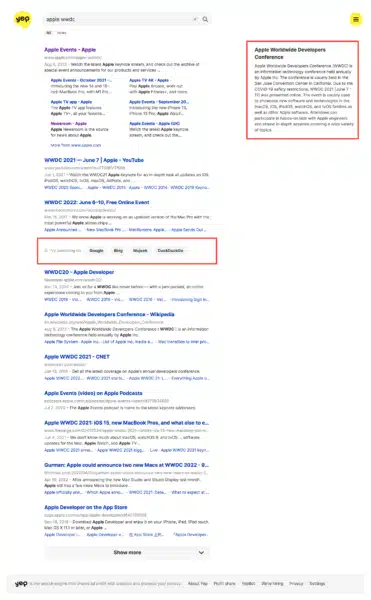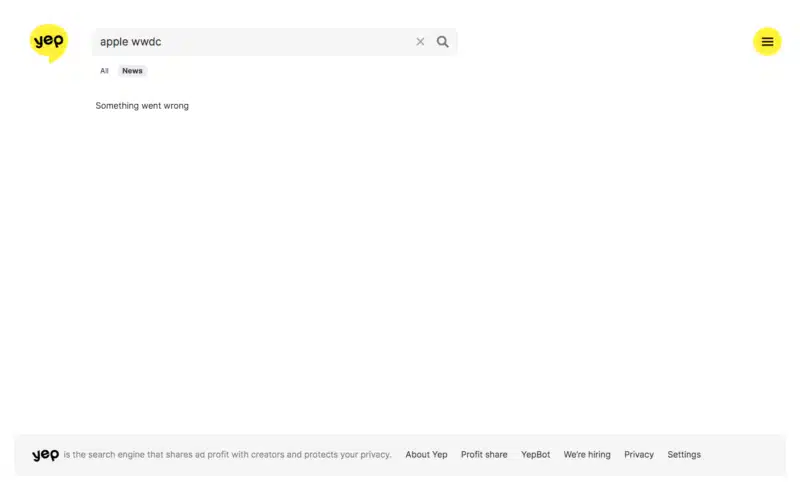Ahrefs reveals its new search engine: Yep
Here's everything we know so far about Yep, the new web search engine created by the Ahrefs team.
Did you forget that SEO toolset provider Ahrefs announced plans to build its own search engine in 2019?
If you answered “yep,” you aren’t alone.
Ahrefs has been busy in those three years since, investing $60 million of its own money into launching a new search engine, called Yep.
What is Yep?
Yep is a general-purpose web search engine. Yep will soon be available in all countries and in most languages. There will be an announcement when the official launch happens.
Ahrefs is positioning it as a Googe competitor. However, we’ve seen plenty of Google competitors and Google “killers” come and go over the past two decades. So for now, let’s just call it a Google alternative.
Why is it called Yep?
Ahrefs said the name Yep doesn’t have any specific meaning. Yep came up the first time when the team was watching Avatar cartoons with kids and Aang and friends used “yip yip” to make their bison take off.
Choosing a name for the search engine was a struggle. The Ahrefs team checked hundreds of ideas over the last two years.
Initially, the team settled with Fairsearch.com expecting to transit to Fair.com. But we could not get Fair.com.
Long story short: Yep is a nice, short, easy-to-remember name.
So what is Yep banking on to become a true Google alternative? Two things:
Privacy
Yep will not collect personal information (e.g., geolocation, name, age, gender) by default. Your Yep search history will not be stored anywhere.
What Yep will rely on is aggregated search statistics to improve algorithms, spelling corrections, and search suggestions, the company said.
“In other words, we do save certain data on searches, but never in a personally identifiable way,” said Ahrefs CEO Dmytro Gerasymenko. “For example, we will track how many times a word is searched for and the position of the link getting the most clicks. But we won’t create your profile for targeted advertising.”
What Yep will use is a searcher’s:
- Entered keywords.
- Language preference received from the browser.
- Approximate geographical area at the origin of the search at the scale of a region or a city (deduced from the IP address).
Revenue-Sharing
[Editor’s Note: Originally, Ahrefs referred to this as profit-sharing, and you’ll still see some quotes I’ve cited, but they have since told me that their preferred term is revenue share.]
The plan for Ahrefs’ search engine is a 90/10 revenue-sharing model, where Ahrefs shares 90% of its advertising revenue with content publishers.
The reason: Google displays content in its search results, without the need to actually click through to the website. That means websites are losing traffic. And for many sites, less traffic means less revenue.
“Creators who make search results possible deserve to receive payments for their work,” Gerasymenko said. “We saw how YouTube’s profit-sharing model made the whole video-making industry thrive. Splitting advertising profits 90/10 with content authors, we want to give a push towards treating talent fairly in the search industry.”
Here’s what Yep says:
“Let’s say that the biggest search engine in the world makes $100B a year. Now, imagine if they gave $90B to content creators and publishers.
Wikipedia would probably earn a few billion dollars a year from its content. They’d be able to stop asking for donations and start paying the people who polish their articles a decent salary.
There would be no more need for paywalls and affiliate links, so publishers who’ve had to resort to chasing traffic with clickbait articles and filling their pages with ads would be able to get back to doing investigative pieces and quality analysis. A citizen journalist uncovering corruption on the side of a full-time job could get compensated without having to spend time trying to monetize content.
And the best thing? You don’t have to be an expert to benefit.
Let’s say that you love pancakes more than anything else in the world. Now you have an incentive to grow that passion – imagine getting fairly paid to share creative recipes, publish photos of your creations and teach the rest of the world how they, too, can make the fluffiest pancakes ever. Independent creators everywhere will finally be able to flourish.”
How would this actually work?
Let’s say Yep gets $100 from an advertiser. Yep would keep $10 and $90 would go into a distribution fund for creators.
Yep is still drafting specifications around this, but told me that creators would have to sign up with an account for identity verification (e.g., email, Twitter). Then, they would have to add a tag to their webpages so Yep could track and distribute that money based on impact.
And what exactly will Yep consider a “creator”? According to Yep, it can be a website, brand, person or publisher.
Here’s what a Yep spokesperson told me:
- “We also consider the option when a content platform like Medium will be adding their users revenue share ID to articles but also their own ID. For example, some platform X can be taking 20% of revenue share to themselves for hosting service and give 80% to the author. So they will put these rules in markup and we will follow.”
For transparency, the company plans to make the audited revenue report public.
All of that sounds nice in theory. But Yep hasn’t even officially launched yet.
DuckDuckGo, which launched in 2008, gets as many searches per year (~15.7 billion) as Google gets in about two or three days. Even Microsoft Bing – which is owned by Microsoft, the third-largest company on the planet by market cap – has failed to make a significant dent in Google’s search market share since 2009.
What about PPC advertising?
Don’t expect to see an announcement about Yep Ads until the team is happy with the quality and relevancy of its organic search results.
Yep told me it would be premature to add pay-per-click advertising at this point.
How Yep works
What really matters is search quality. That means Yep will have to satisfy the wants and needs of searchers. So how are they going about putting together those search results?
Crawling
Yep collects website data using AhrefsBot. Ahrefs said it plans to replace AhrefsBot with YepBot in the “near future.”
AhrefsBot visits more than 8 billion webpages every 24 hours, which makes it the second most active crawler on the web, behind only Google, Ahrefs said.
For 12 years, AhrefsBot has been crawling the web. They had just been using the AhrefsBot data to power its link database and SEO insights,
Indexing
The Yep search index is updated every 15 to 30 minutes. Daily, the company adds 30 million webpages and drops 20 million.
Ranking and search quality
How does Yep judge the quality of its search results for given queries?
Results must be relevant and helpful, according to the team. For now, they use their own judgment as they continue to build a set of evaluation criteria. Here’s what the team said:
- “Internally we build a set of queries ~1000 for different topics and in different languages with each query having a list of top websites/URLs. It helps us to run QA at scale. So each time we change parameters we can see at scale if the results become better or worse. We have also a score, which is getting higher when good links are present and higher if the beast links are on top. Then we experiment with features and models to make this score higher.”
And what matters for ranking on Yep? Here’s what the team told me:
- “We use content signals and link signals. Plus we apply NLP features using BERT and other models. There are thousands of signals combined together to build the final search results. Some are obvious like having terms in the title, h1 or content. Or referring anchor, etc.”
Developers are still working to improve Yep’s search results and algorithms, step by step. Ahrefs said, at this point, they have a “satisfactory web search,” but Yep is not yet there yet to compare search results against Google or Bing.
Other technical details
Ahrefs said its Singapore data center is powered by around 1,000 servers that store and process 100 petabytes of web data (webpages, links between them, and the search index). Each server uses at least 2x 100GB connections. Some servers use multiple GPU cards to train big transformer models.
Before the end of the year, Ahrefs plans to open a U.S.-based data center.
Ahrefs ultimate goal?
In 2019, Gerasymenko said the goal of its then-hypothetical search engine was to attract the attention of a larger company (e.g., Microsoft) that could afford to bring the idea to scale.
“Considering the platform only generates a fraction of the company’s $120 billion revenue, the organization could easily revamp Bing under a profit-share model. It’s my prediction that the positive public sentiment alone would have greater ROI than existing ad revenue. If we succeed in our endeavors, Google will finally get some long overdue competition for search.”
Ahrefs CEO Dmytro Gerasymenko, “Investor money vs. public interest: did Google fail to build a non-evil platform?“
However, that is no longer the case. Ahrefs told me they are:
- “Not looking at Microsoft anymore. Since big search engines did not want to adopt revenue share, we will walk the walk ourselves.”
Ahrefs is planning to allocate “tens of millions” per year to a marketing budget to promote Yep. Some of this marketing will target creators.
Yep search results
Yep’s search result pages (SERPs) are minimal. It’s not quite at the level of the old days of 10 blue links, but it’s not far from it.
Your options are web or news results. (An image index is “very close” – image search should be added in July.)
There are also “knowledge” boxes on the right side of some SERPs, featuring content pulled from Wikipedia, about your search. (Ahrefs said they don’t have an official name for this box yet.)
Here’s an example search for [apple wwdc]:

You’ll notice the Apple Events page gets six sitelinks. Many of the other results also have additional links under the search snippet.
And the news results for [apple wwdc]? Well, it seems something went wrong:

Yep also gives you the option to try your same search other search engines – Google, Bing, Mojeek and DuckDuckGo.
Of note: the first organic result for all four other search engines is Apple’s official WWDC page, unlike Yep. That’s a fail. And Yep’s results are much staler than all the competitors it points to, aside from Mojeek’s (which are pretty atrocious).
For comparison, here’s what those look like:




The [Apple WWDC] results for Google, Bing and DuckDuckGo are all much fresher, featuring links to news stories from within the past few minutes or hours, published by CNN, CNBC, MacRumors, TechCrunch and others.
I asked Yep about these stale results and was reminded this is not a release yet:
- “We are improving things, the way we index, the way we search, the way we show results.”
Bottom line: Yep’s stripped-down version of search results aren’t a dealbreaker. And if you don’t care about fresh results, perhaps these results are passable – especially where this is a broad search term. But clearly, Yep has some work ahead of it before it will be a serious alternative and convince searchers to use it over Google – or help any creators earn more than pocket change.
This story was updated on June 22.
Search Engine Land is owned by Semrush. We remain committed to providing high-quality coverage of marketing topics. Unless otherwise noted, this page’s content was written by either an employee or a paid contractor of Semrush Inc.


